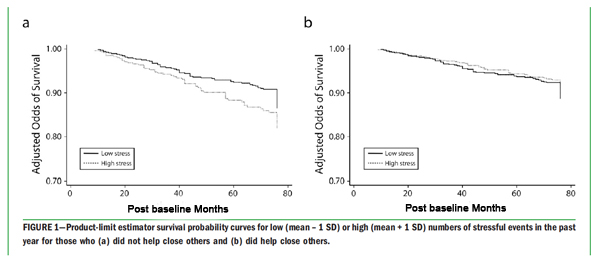
November 11, 2013 - For more than 20 years researchers have known that strong social ties increase longevity and physical health, but the mechanisms that link the social environment with health outcomes are not clear. One common hypothesis is that receiving support from others buffers the negative influence of psychosocial stress, but a new study by Stephanie Brown and colleagues suggests that giving support to others, rather than receiving support, buffers the negative influence of psychosocial stress on mortality.
Dr. Brown and her colleagues re-analyzed data obtained from 846 older adults who participated in a prospective study of older couples in the Detroit area. Seventy-four percent reported that they had provided significant help to someone close to them during the previous year and 30% reported that they had experienced at least one stressful event (serious illness, job loss, death of a family member, etc.) during the previous year. Using mortality data from the subsequent five years, the researchers found, as they expected, that stressful events predicted increased mortality.
When they considered the role of helping behavior, they found that stress increased the risk of earlier mortality only among those who did not engage in helping behaviors, but did not increase risk among those who provided help. The presence of a stressful event in the lives of participants who did not engage in helpful behavior decreased the odds of survival over time by about 30%, while a stressful event in the lives of participants who provided help to others had no effect on the odds of survival.
These findings demonstrate for the first time that helping behavior predicts reduced mortality by buffering the effects of stress. This discovery may have implications for public policy. If a link between helping behavior and health is demonstrated in the general population or at-risk populations, policy makers may want to emphasize the importance of helping others. As the authors point out, “At-risk populations are frequently advised to seek support from their social networks. A less common message, but one that perhaps deserves more prominence, is for them to support others as well.”
The article, titled “Giving to Others and the Association Between Stress and Mortality” was published in the September 2013 edition of the American Journal of Public Health. Michael J. Poulin, PhD, who worked with Dr. Brown as a postdoctoral fellow, was the lead author.

Figure adapted from “Giving to Others and the Association Between Stress and Mortality” American Journal of Public Health September 2013.